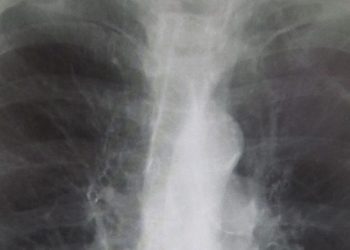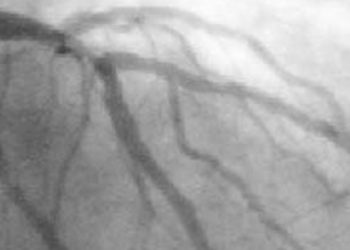Benralizumab does not reduce the rate of acute COPD exacerbations
1. Patients treated with benralizumab did not experience a reduced annual rate of acute COPD exacerbations.
2. However, benralizumab treatment conferred clinically significant improvement in lung function as shown by increased pre- and post-bronchodilator FEV1.
Evidence Rating Level: 1 (Excellent)
Study Rundown: Chronic obstructive pulmonary disease (COPD) is a lung disorder marked by airway obstruction and chronically poor airflow. In a subset of 10-20% of COPD patients, obstruction is thought to be brought on by eosinophilic irritation of the airways. Interleukin-5 (IL-5) is a regulatory cytokine for the survival and proliferation of eosinophils. Benralizumab, a humanized antibody to interleukin-5 receptor α, has been shown to reduce blood and sputum eosinophil counts. This study assessed the safety and efficacy of benralizumab in decreasing the rate of acute COPD exacerbations in patients with pre-existing sputum eosinophilia. Clinical measures such as forced expiratory volume in one second (FEV1) as well as patient questionnaires were utilized to examine treatment efficacy.
The results showed that benralizumab did not reduce the annual rate of acute COPD exacerbations when compared to placebo. Measurement of efficacy using patient questionnaires proved non-significant as well. However, benralizumab decreased blood and sputum levels of eosinophils and significantly improved lung function as shown by an increased pre- and post-bronchodilator FEV1 compared to placebo. The study was limited by its small sample size as the lack of a sufficient number of patients underpowered several analyses carried out by the authors. Additionally, although the rate of COPD exacerbations was analyzed there was no attempt to define the causes of these events. The authors concluded that although benralizumab did not reduce acute COPD exacerbations, it was effective in improving other measures such as lung function, which supports further investigation of benralizumab in patients with eosinophilic COPD.
This study was funded by MedImmune.
Click to read the study, published today in The Lancet Respiratory Medicine
Relevant Reading: Exacerbation rate, health status and mortality in COPD–a review of potential interventions
In-Depth [randomized controlled trial]: This phase 2a study included 101 adult patients aged 40-85 years with moderate-to-severe COPD, with 82 included in the per-protocol population. Inclusion criteria were defined as at least one acute COPD exacerbation in the past year, present or past smokers with a 10+ pack-year history, a post-bronchodilator FEV1 <80% predicted, a FEV1 to forced vital capacity ratio of <70%, and a sputum eosinophil count of >3.0% for 12 months prior to or at screening. Patients were block randomized to receive either 100mg benralizumab (n=40) or placebo (n=42) subcutaneously every 4 weeks for 3 doses, then every 8 weeks for 5 doses over 48 weeks. The primary endpoint was annualized rate of moderate and severe acute COPD exacerbations at week 56.
Benralizumab did not reduce the annualized rate of COPD exacerbations (0.95, 95% Confidence Interval [CI] 0.68–1.29) compared to the placebo group (0.92, 0.67–1.25). However, patients receiving benralizumab experienced a significant reduction in blood and sputum eosinophil percentages at weeks 4 and 8 of treatment, respectively. Additionally, benralizumab significantly improved pre-bronchodilator FEV1 vs. placebo (-0.06L [SD 0.24] vs. 0.13L [0.41], p=0.014) and post-bronchodilator FEV1 vs. placebo (-0.08 L [SD 0.21] vs 0.09 L [0.39], p=0.014). No significant differences were noted between groups for SGRQ-C, CRQ-SAS, or BODE questionnaire scores. 45 (88%) patients reported treatment-emergent adverse effects and 14 (27%) patients reported serious adverse effects in the benralizumab group vs. 41 (82%) and 9 (18%) in the placebo group. The most common adverse events were respiratory disorders and infections. Two (4%) patients in the benrazlizumab group died during the study (one due to myocardial infarction, and the other suddenly from an unknown cause), but the authors did not consider either to be related to benralizumab treatment. One (2%) patient in the placebo group died from bronchitis after study completion.
More from this author: Lifetime diabetes risk rises as incidence increases and mortality decreases, Early alteplase treatment leads to better stroke outcomes regardless of age or stroke severity, Improved hematologic cancer survival in Europe over a 15 year period [EUROCARE-5 study], Vitamin D may reduce the risk of hypertension, Schizophrenia linked with higher rates of violence, suicide, and early mortality
Image: PD
©2012-2014 2minutemedicine.com. All rights reserved. No works may be reproduced without expressed written consent from 2minutemedicine.com. Disclaimer: We present factual information directly from peer reviewed medical journals. No post should be construed as medical advice and is not intended as such by the authors, editors, staff or by 2minutemedicine.com. PLEASE SEE A HEALTHCARE PROVIDER IN YOUR AREA IF YOU SEEK MEDICAL ADVICE OF ANY SORT.






